Ionic Liquids With Solid State Nanopores: New Valuable Progress From Ruđer Bošković Institute (IRB)
May 28, 2021 - A recently published study on ionic liquids with solid state nanopores at the Ruđer Bošković Institute (IRB) can help the energy storage sector.
The top scientific and research institution in Croatia, the Ruđer Bošković Institute (IRB), continues to be the home of interesting scientific progress.
Researchers from the IRB's computer bioscience team, Nataša Vučemilović-Alagić, and dr. Mario Špadina under the mentorship of dr. Ana Sunčana Smith cleared the phenomenon of transport inside liquids on the principle of nanopores in the solid-state. A nanopore is a small cavity in solid matter, invisible to the naked eye. This IRB research was done in collaboration with dr. Sanjin Marion and dr. Aleksandra Rađenović from École Polytechnique fédérale de Lausanne (EPFL) in Switzerland and the research results are published in the prestigious scientific journal Small which specializes in nanotechnology.
Professor Ana Sunčana Smith's IRB team deals with molecular descriptions of chemical and physical interactions of ionic liquids (liquids that are not neutral but have either positive or negative electric charge) on various solid surfaces. The goal was to determine the impact of specific ions and specific surfaces. The appliance of this knowledge is in line with guidelines of the EU Green Deal, and the UN sustainable development goals", explained IRB in the official press release.
The press release added this knowledge is useful in storing energy, as ionic liquids in nanopores represent an alternative to batteries.
„In this research, starting from the principle of water solutions, we combine ionic fluids and nanopores of different geometric features and materials to secure new nanofluid functionalities. This solves some of the relevant issues in the understanding of basic principles of transports in space-limited ionic liquids and ensuring better control of the speed of translocating within an analyte“, explained Dr. Ana Sunčana Smith.
It's worth noting that dr. Sunčana Smith is one of the Croatian scientists that received support from the Croatian European Research Council (ERC) for a very prestigious project in researching biological membranes worth 1,5 million euros.
Energy efficiency is something IRB shows to be really dedicated to, as evident by the progress IRB researchers made in exploring materials for converting CO2 to methanol alcohol, and IRB's Rovinj Sea Research Centre that celebrated 130 years of existence this year priorities maritime ecology and its protection in its research.
Learn more about Croatian inventions & discoveries: from Tesla to Rimac on our TC page.
For more about science in Croatia, follow TCN's dedicated page.
Croatia and Taiwan Expand Economic Relations Despite Pandemic
ZAGREB, 27 May 2021 - Croatia and Taiwan continued expanding their economic relations, despite the pandemic, and cooperation can be bolstered in IT, tourism, supplies of medical equipment surveillance equipment, cosmetics, and food products, a meeting of the Taiwan-Croatia Business Council heard on Thursday.
The meeting was organized by the Croatian Chamber of Commerce (HGK), the Chinese International Economic Cooperation Association (CIECA), Taiwan, and the Importers and Exporters Association of Taipei (IEAT).
Ivan Barbarić at HGK said that the main topic of today's meeting was smart tourism and IT solutions for other sectors.
CIECA advisor Fred P. C. Huang underscored that expanding economic relations between Croatia and Taiwan continued despite the pandemic.
Croatia is a country with a dynamic economy and is recognized for its tourism industry, said Huang.
"Croatia's IT sector is also quite strong and those two industries have great potential to develop relations between our countries," said Huang and added that CIECA and HGK keep working on networking entrepreneurs.
Head of the Taipei Economic and Culture Office in Austria, Katharine Hsiao-Yueh Chang underscored that Croatia and Taiwan are natural partners with regard to economies.
According to Taiwanese statistics, our bilateral trade is usually about $50 million. As a consequence of coronavirus, Taiwanese imports to Croatia fell by 19% in 2020 whereas Croatia's imports to Taiwan increased by 68%. In the first few months of this year, an unbelievable growth in Croatian imports on our market occurred by as much as 237% and that is a figure that clearly shows what sort of potential we are talking about," she said.
According to Chang, Croatia is a sought-after destination for Taiwanese tourists while hundreds of Croatian professionals work in Taiwan on cruise ships and offshore wind parks.
We are glad to see that the pandemic is waning slowly and this is the right time for meetings like this so we can take up good positions and continue to strengthen cooperation, said Chang.
Secretary-General in the Taiwanese Bureau of Foreign Trade, Ministry of Economic Affairs, Amelia W.J. Day confirmed that in the past three years, Croatian imports to Taiwan increased drastically.
I am certain that after this meeting we will have better insight into the potential for trade to grow. The sectors we focused on today will help our relations to boom in the post-COVID period. Taiwan has excellent IT companies that can help Croatia to develop tourism based on sustainable principles," said Day, and in particular stressed the potential in engineering and food production.
Local companies like Infosit, Inter Soft Technologies, and the Šibenik Fortress of Culture project were presented to the Taiwanese partners.
Smart tourism was the main focus of today's meeting while B2B meetings focused on cooperation in the field of medical equipment, surveillance equipment, cosmetics, food products, and other sectors.
For more about politics in Croatia, follow TCN's dedicated page.
Summer Business School: A Chance for Entrepreneurs at Step-Ri Science-Technology Park
May 27, 2021 - This June, a five-day Summer Business School organized by Step-Ri Science-Technology Park and the American Embassy in Croatia makes Rijeka the place for entrepreneurs.
Science parks, research parks or technology parks or less intriguingly known as innovation centers, are a purpose-built cluster of office spaces, labs, workrooms, and meeting areas designed to support research and development in science and tech, says Bidwells, one of the UK's most reputable property consultancy companies. Common infrastructures worldwide and in Europe, the biggest city in Kvarner, Rijeka, is no exception in having one.
Step-Ri is a science-technology park, part of the University in Rijeka, and a place where science and economy meet to encourage entrepreneurship based on knowledge and new technologies.
„As one of the leading institutions in Croatia when it comes to entrepreneurship, Step Ri brings the newest knowledge in innovation and management from around the world through interesting education and business consulting. With our knowledge and experience, singlehandedly and with the help of the international network of partners and friends, we create projects and specialized programs to encourage entrepreneurship initiatives for both employed and unemployed, students, and the scientific community. With new services, business models, personal and organizational competencies, we make already successful entrepreneurs more competitive“, says Step-Ri's official website.
One example of such initiatives is the upcoming Summer Business Camp which will take place from June 23-27. And what's more interesting, this five-day program is brought to Step-Ri in collaboration with the American Embassy in Croatia.
„Summer Business Camp brings teams from all Croatia that want to improve or refine their business ideas and solutions through exercises, lectures, and individual coaching, “says Step Ri, promising extraordinary mentoring from successful entrepreneurs and investors.
This year, special attention will be given to the gaming startups, but other industries are also welcome. Regardless of whether you are already an entrepreneur or just aspiring to be one, you are welcome to apply if you have a developed business idea or a functional prototype.
Learning how to bulletproof your idea, experienced entrepreneur as a mentor, a chance to hear directly from investors what are they looking for and how to deliver it, valuable feedback and honest thoughts to accelerate your project, creating new opportunities, meeting other people in the business, and a having a good time- are some of the promises by Step-Ri for those who apply.
But, it would be best if you hurried, as June 6 is very close, and that's the deadline to beat. At least ten teams will be selected after a committee of experts evaluates project applications. Bed and breakfast accommodation for up to two team members, lunch at the venue, local bus tickets for getting to the venue, and a commemorative T-shirt await for those who are selected. And once in, a panel of venture capitalists, business angels, and business people will award the best with Apple iPad Pro (1st prize), Apple iPad Air 4 (2nd prize), and Apple iPad 8 (3rd prize).
Pieces of technologies such as the aforementioned above can certainly come in handy to entrepreneurs, but what about money? The actual finance for your projects?
„Many teams in the past received funding from participating investors and judges. However, nobody but you can answer that! Come and pitch your idea and see how far it will take you!“concludes Step-Ri regarding finance possibilities to turn your vision into a reality.
Learn more about Rijeka on our TC page.
For more about education in Croatia, follow TCN's dedicated page.
Slovenian PM Supports Croatia's Schengen Entry
ZAGREB, 26 May, 2021 - Slovenian Prime Minister Janez Janša on Wednesday supported the Schengen entry of Croatia, Bulgaria and Romania as it would strengthen security in Europe.
We support Croatia's entry to the Schengen Area, as well as the entry of Bulgaria and Romania. We believe those are steps that strengthen security in Europe, he told a joint press conference with European Parliament President David Sassoli.
He spoke at the press conference via video link from Ljubljana after presenting to European Parliament leaders the priorities of the Slovenian presidency of the Council of the EU, which starts on 1 July.
Croatian PM Andrej Plenković said in Brussels on Tuesday he expected Croatia's Schengen membership could be on the agenda during the Slovenian presidency.
"Croatia is on the right track to become a member of the Schengen Area in 2022 and then to enter the eurozone. I think that's possible. When we look at the very good relations we now have with Slovenia, it would be a great scenario if something like that happened during Slovenia's presidency of the Council of the EU," he told the press.
Janša today also supported EU enlargement to the Western Balkans, saying many problems there, including the border issue, would be taken off the agenda with the accession of those countries.
EU enlargement is in our common interest. It should be our strategic response to numerous challenges, he added.
He said that when the EU was dealing with the financial and then the migrant crisis, neglecting enlargement, some other factors started expanding their influence in the Western Balkans.
Those foreign factors don't have the same values as we in the European Union, he added.
Janša said a European perspective was the answer.
We can solve problems by making borders less important. Slovenia is now part of the European Union and Schengen, where there are no physical borders, he added.
He announced an EU-Western Balkan summit for 6 October in Slovenia.
As for the priorities of Slovenia's EU presidency, Janša highlighted respect for the rule of law and EU resilience to crises. He also underlined the importance of the Conference on the Future of the EU, which will end next year during the French presidency.
For more about diplomacy in Croatia, follow TCN's dedicated page.
JANAF, OMV Sign First Oil Storage Contract
ZAGREB, 26 May, 2021 - The JANAF oil pipeline and storage system said on Wednesday it had signed its first contract with Austria's OMV Supply & Trading Ltd for storing up to 99,000 cubic metres of crude oil at the Omišalj Terminal for a period of two years.
Management said the contract confirmed JANAF's strong export orientation, adding that the company generated over 60% of its revenue from foreign clients.
The new contract ensures the further use of our storage capacity and stable business in the longer term, Management Board chairman Stjepan Adanić and Board member Vladislav Veslica said.
For more about diplomacy in Croatia, follow TCN's dedicated page.
Friends of Croatia: UNICEF - Croatia an Example to the World When it Comes to Breastfeeding
May 27, 2021 - The sixth article in the "Friends of Croatia: UNICEF" series explores the work of the UNICEF Office for Croatia. What is done regarding children's rights in Croatia, positives, and negatives, and how can you help if you want to?
To ensure that our world even stays the same, let alone improves, new generations are essential. But, before they grow old enough to participate in society, society must first take care of the youngest ones to grow and develop. Society must ensure for kids that they grow up in families filled with love, make sure that kids can go to school, that they are healthy, safe from violence, that they are not hungry or thirsty, and give them overall opportunity to make it in the world.
Basically, children have rights, and they are in more detail elaborated in 54 articles. For more details, have a look at the Convention on the Rights of the Child that came to power on September 2, 1990, by the United Nations (UN) General Assembly.
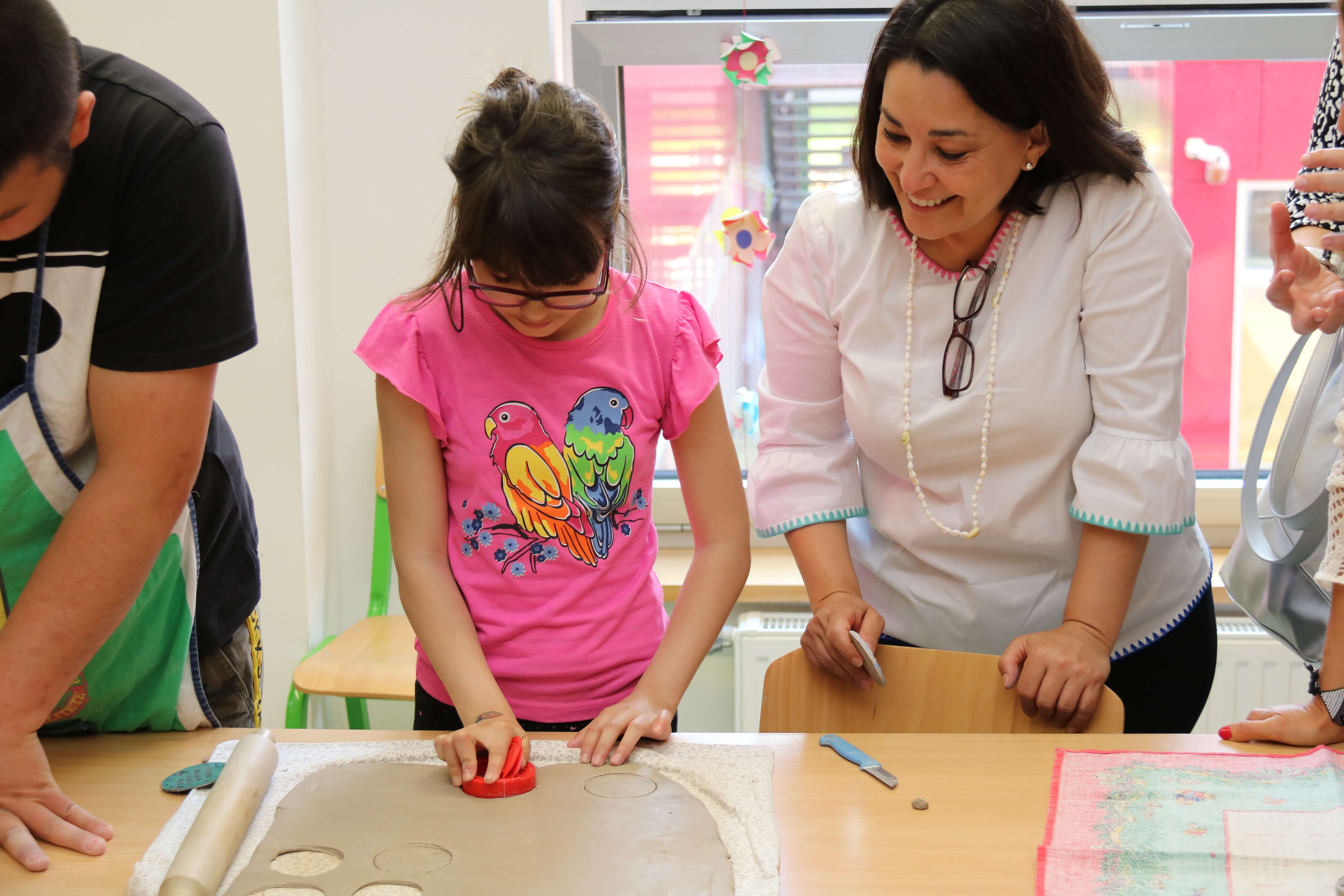
Regina M. Castillo, UNICEF office for Croatia representative with children with disabilities in Centre Tomislav Špoljar in Varaždin © Marin Ilej/UNICEF
The UN is dedicated to seeing this Convention is being respected, and United Nations International Children's Emergency Fund, commonly known as UNICEF, specializes in the issues of children's rights. Established in the aftermath of World War II, UNICEF has been at the frontlines of humanitarian crises, armed conflict, and natural disasters.
„Undeterred by the scale of the crises, we rise to the challenge, reimagine what is possible and respond by helping millions of children survive and thrive. Our on-the-ground expertise has reached more than 191 countries and territories, through committed partnerships and a passion for innovation“, says UNICEF on its official website.
Croatia signed and agreed with the Convention, and UNICEF today has its own office in Zagreb. Furthermore, it's worth noting that UNICEF has existed for 75 years, and despite firstly coming to Croatian territory while the country was part of the former Socialist Federal Republic of Yugoslavia, UNICEF has been with Croatia since the organization was established.
„Many people do not know that UNICEF helped to eradicate malaria in Croatia and that UNICEF played a key role in the development of modern dairy. Dairies were built in Zagreb, Rijeka, and Split, and factories for the production of powder milk in Osijek and Županja. Milk was distributed in schools, and for many children, it was their only meal during the day“, says Regina M. Castillo, UNICEF Office for Croatia representative.
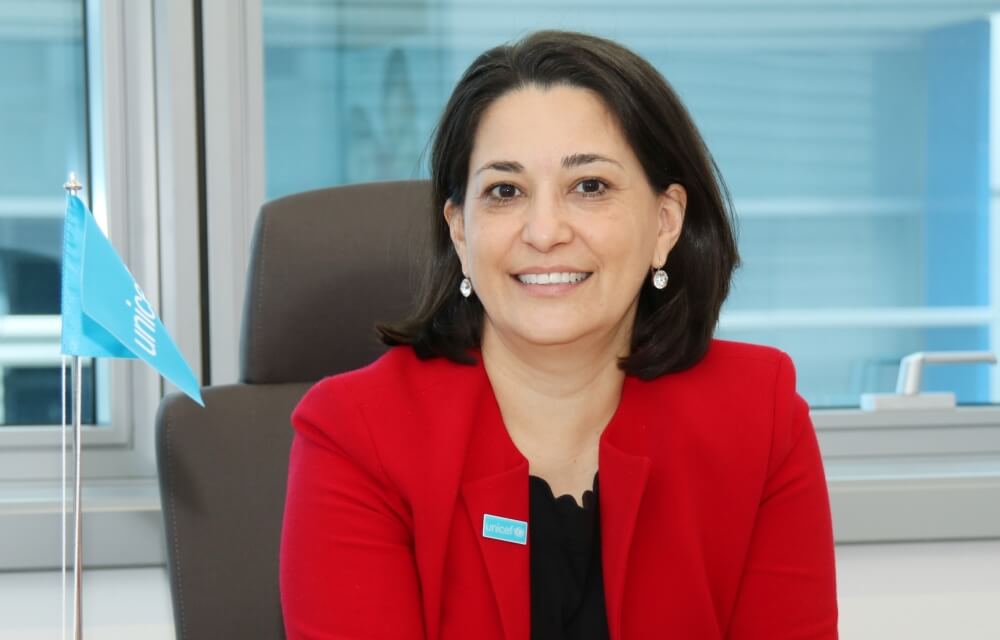
Regina M. Castillo, UNICEF office for Croatia representative © Marin Ilej/UNICEF
The UNICEF representative is elected for a five-year mandate, and Regina M. Castillo came to her function in Croatia in 2019. Her career in the UN started in 2001 and was in charge of economic and social questions in the Executive Office of the UN chief secretary Kofi Annan in New York. This was followed by Castilla moving to work in the mutual program for HIV/AIDS, known as UNAIDS. She was first the director of private sector partnerships in Geneva (2006-2012) and then moved to be the director for Bolivia, Ecuador, and Peru (2012-2015). She majored in International relations and public politics.
Born in Nicaragua, she first started her career in the 1990s as a diplomat, and she was also the headmistress for international trade in the Nicaraguan Trading Ministry.
Helping Croatia before it was cool (or an independent country)
Castillo went on to continue that after World War 2, UNICEF fed six million children every day, which included many children in Croatia.
„One of those children was our dear colleague, prof. Josip Grgurić, who is still working tirelessly for the youngest. He still remembers the yellow cheese that was part of UNICEF's humanitarian package for families, as well as the chocolate that he then tasted for the first time. He later worked at the children's hospital in Klaićeva, which UNICEF helped found, and he still works hard on UNICEF’s Child-Friendly Hospital Initiative“, says Castillo indicating how valuable but also inspiring UNICEF can be to children. Castillo added that in the Homeland War, UNICEF was the first organization on the ground, making sure that children and families received the necessary psychosocial support and humanitarian packages. After the war, they educated children on how to protect themselves from landmines.
Today Croatia developed, joined NATO and EU, and is a modern European country. With such progress, there have been many improvements in respect to children and their rights.
„Croatia has a low mortality rate of children under the age of five, extremely low stunted growth rate due to inadequate nutrition in the first years of life and the enrolment rate of children in primary school is almost 100 per cent“, pointed out Castillo.
„Croatia is an example in the world when it comes to the promotion of breastfeeding. It is rare that all public maternity wards in a country have the status of 'Child-Friendly Hospital'. With the support of UNICEF, partners have organized a network of breastfeeding support groups, and now we have more than 200 support groups in Croatia“, added Castillo on what the world can look up to this small South-Eastern European country.
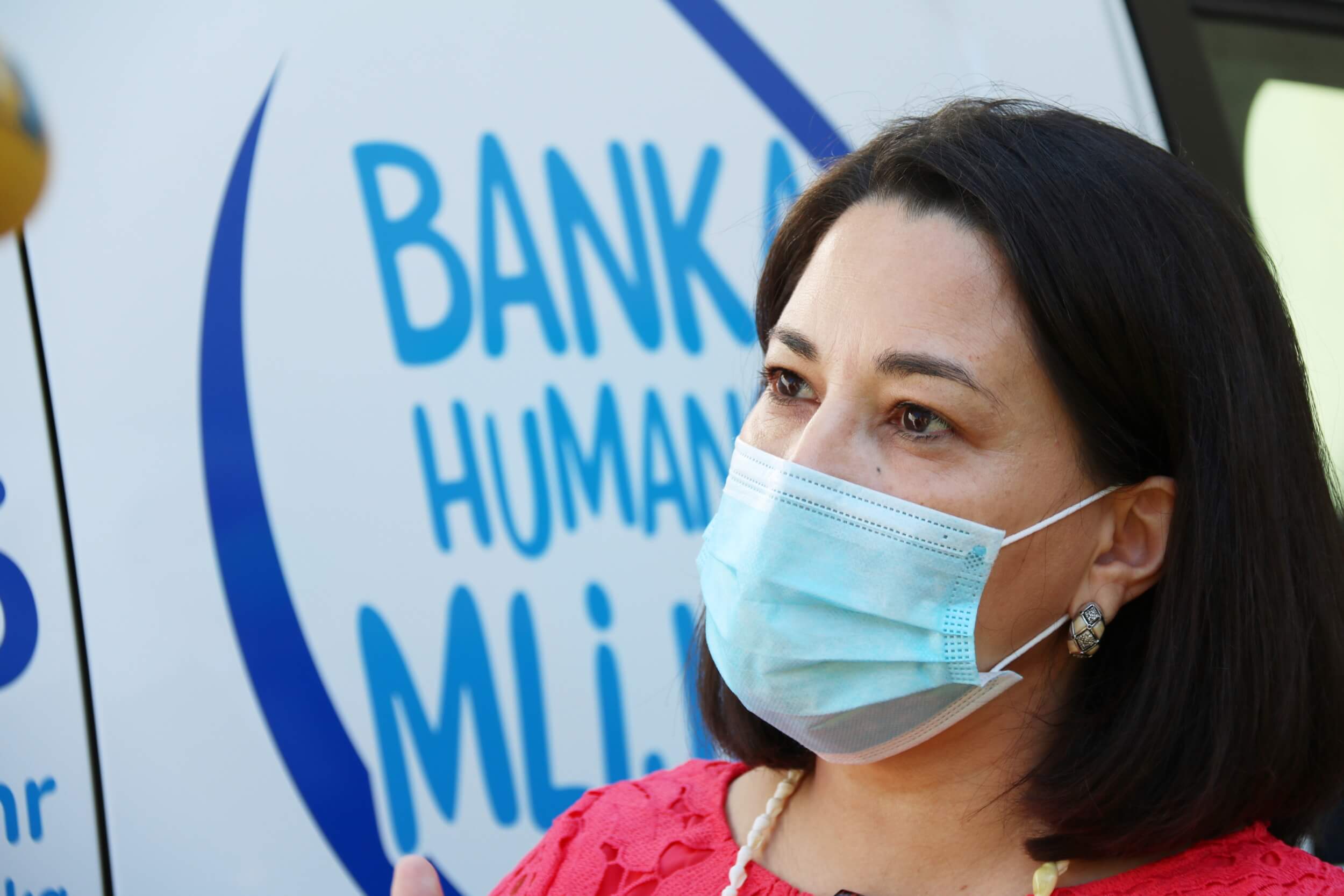
Regina M. Castillo at Human milk bank © Marin Ilej/UNICEF
Still, there are some issues Croatia needs to address and are far from ideal at the moment.
„There are still differences when it comes to access to services for children, depending on where they live and the conditions in which they grow up. Children with disabilities, as well as children from the poorest families, especially in rural areas, often do not have the opportunity to attend kindergarten and do not have the same access to specialized health services and therapies as children in urban areas. The focus of UNICEF in Croatia is on the most marginalized children: children with disabilities or developmental delays, children growing up without adequate parental care, children from minority groups, children at the risk of poverty and exclusion. UNICEF’s programs are focused on the well-being and protection of every child, with a special focus on the most vulnerable children“, pointed out Castillo.
Campaigns and programmes such as “Every child needs a family”, “The first three are the most important”, and “Stop violence among children” are perhaps the most known public action by UNICEF in Croatia, but returning to the good practices of breastfeeding, Castillo emphasizes the establishment of the Human Milk Bank in her current mandate.
„Thanks to the Human Milk Bank, prematurely born and seriously ill newborns (who do not have access to their own mother's milk) can receive milk donated by other mothers. We continually work on reducing the risk of disasters, support the development of quality foster care and provide support to parents in the upbringing and care of children through workshops and we work a lot with young people“, said Castillo.
In general, UNICEF has different types of offices in countries, and regarding the Croatian office, it’s a Country Office. In other words, most of the resources (human and financial) are invested in programs in Croatia. Castillo says that the five-year mandates have priorities that are determined in cooperation with partners. And while 80 percent of the funds raised are invested in programs for girls and boys in Croatia, there are funds and support programs for children outside of the country.
“For example, in 2018, UNICEF supported child health care in parts of Ukraine affected by the conflict and helped the building of five inclusive children's playgrounds in two refugee camps in Jordan in cooperation with the Ministry of Foreign and European Affairs in 2019. Through the ‘Schools for Africa’ program , which includes many kindergartens and schools throughout Croatia, UNICEF supports the education of girls and boys in Madagascar", Castillo listed several examples.

Regina M. Castillo, UNICEF office for Croatia representative with children on Media Literacy days press conference with Radovan Fuchs Minister of Science and Education, Krešimir Partl, State Secretary at Ministry of culture and media and Robert Tomljenović, Deputy Director of the Council for Electronic Media © Marin Ilej/UNICEF
Overall, the UNICEF Office for Croatia works closely with the Croatian Government, and most notably, with the Ministries of Social Welfare, Education, Health, and the Ministry of Foreign and European Affairs. Other partners also include experts (Croatian experts, but also building on expertise and good practice from all over the world), professional associations, academia, services providers, and NGOs.
“UNICEF’s goal is to connect all stakeholders and to advocate and support systemic change for the well-being of all children. System change is a gradual process, and it can be challenging, but when it comes to children’s rights, every step forward is well worth the effort”, explained Castillo.
Croatian citizens showing support for UNICEF
On one hand, Croatia is a good country with low mortality rates of kids and a role model for breastfeeding promotions. On the other hand, however, peer to peer violence (on whose suppression the aforementioned “Stop violence among children“ campaign works heavily on), and unequal approach to education between rural and urban areas show Croatia has both its ups and downs. Unfortunately. The downside sometimes overshadows all the positive things.
One such instance was the tragic death of a two-year-old girl from Nova Gradiška on Easter Sunday. The death of a severely injured girl, who was brought to Zagreb's children's hospital after suffering abuse and heavy beating from her biological parents (and from whom the girl was taken and given to a foster family but was then returned back to biological parents), sparked controversy and citizens outrage, culminating in changes in social welfare law, as well as sacks and investigations in the welfare center in Nova Gradiška.
„We are deeply saddened by the tragic death of two-and-a-half-year-old Nikoll on Easter Sunday. There are no words to express the pain of such a terrible event. Unfortunately, there are no simple and quick solutions to prevent violence against children. For years, UNICEF in Croatia has been continuously and persistently working in the field of child protection, educating experts from the social welfare system, but also other experts who work with children and families, such as experts from the health care, education, and justice systems. UNICEF implements various support programs for parents, and it is fully committed to the development of foster care and the improvement of the legislative framework. However, UNICEF is also aware that society as a whole, has a long way to go to achieve the goal that every girl and every boy is guaranteed the best possible care and protection. UNICEF will continue to work actively, persistently, and dedicatedly with all partners to achieve it”, commented Castillo.
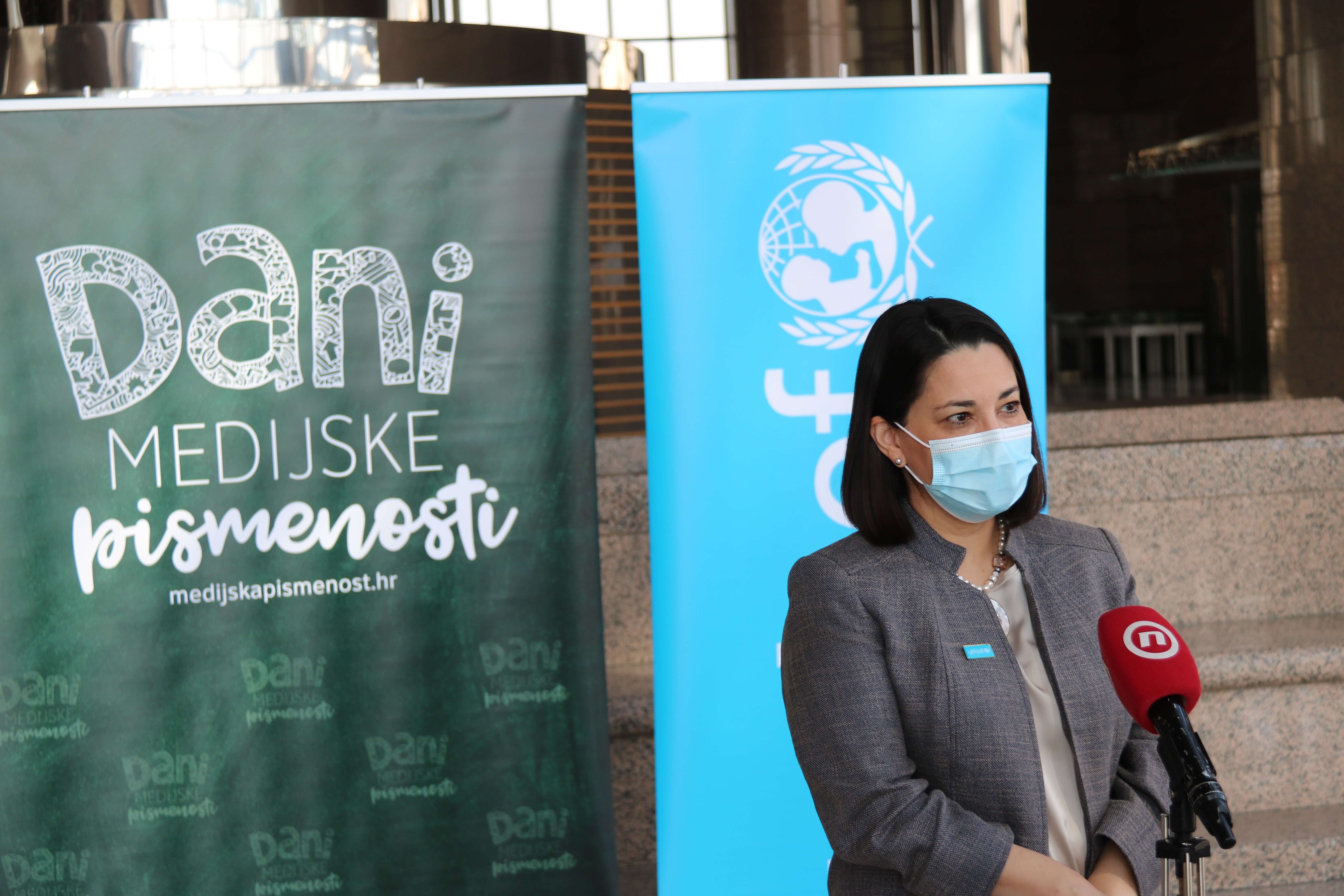
Regina M. Castillo talking on Media Literacy days press conference © Marin Ilej/UNICEF
However, Croatians recognize the importance of the UNICEF mission. Before Covid, UNICEF annually collaborated with the Museum of Illusions on the Museum of Reality exhibition which displayed the problems children faced worldwide, but which also showed what changes and solutions UNICEF brought to those areas.
“Experience tells us that citizens are ready to support the youngest, in Croatia and beyond. Implementation of our programs would not be possible without the support from citizens and companies that placed the focus of their CSR activities precisely on children. We especially value the support from our Childhood Guardians, donors who support our work with regular monthly donations and allow us to regularly conduct our programs for boys and girls, as well as react quickly with much-needed assistance in crisis situations like the earthquakes in Croatia and the COVID-19 pandemic that affected all families. UNICEF is always in the field with the most vulnerable children and their families”, notes Castillo.
In the end is important to note, that while children are recognised as a particularly vulnerable group, all human rights apply equally to children.
“All the rights enshrined in the Convention apply to every child, regardless of a child’s country of origin, gender, religion, and nationality. Every child, by birth, has all his/her rights, the right to grow up in a safe environment, to have a family, to have access to health care and education, to be able to play and develop his/her interests and reach his/her full potential”, concludes Castillo.
The five-year mandate is an agreement that sets priorities in advance, so Castillo warned that there is no opportunity for making donations outside of that framework. UNICEF office occasionally does get messages from citizens who need advice or help on issues outside of that frame, but nevertheless, UNICEF can offer them help by referring them to institutions and addresses that can offer citizens the necessary support, financial support, or information.
With expertise mentioned several times throughout this story as the insurance of delivering the best solutions to issues children face, UNICEF is always on the lookout for new people. If you want to make a change in the world while earning a fair wage yourself, check out what expertise UNICEF is looking for right now.
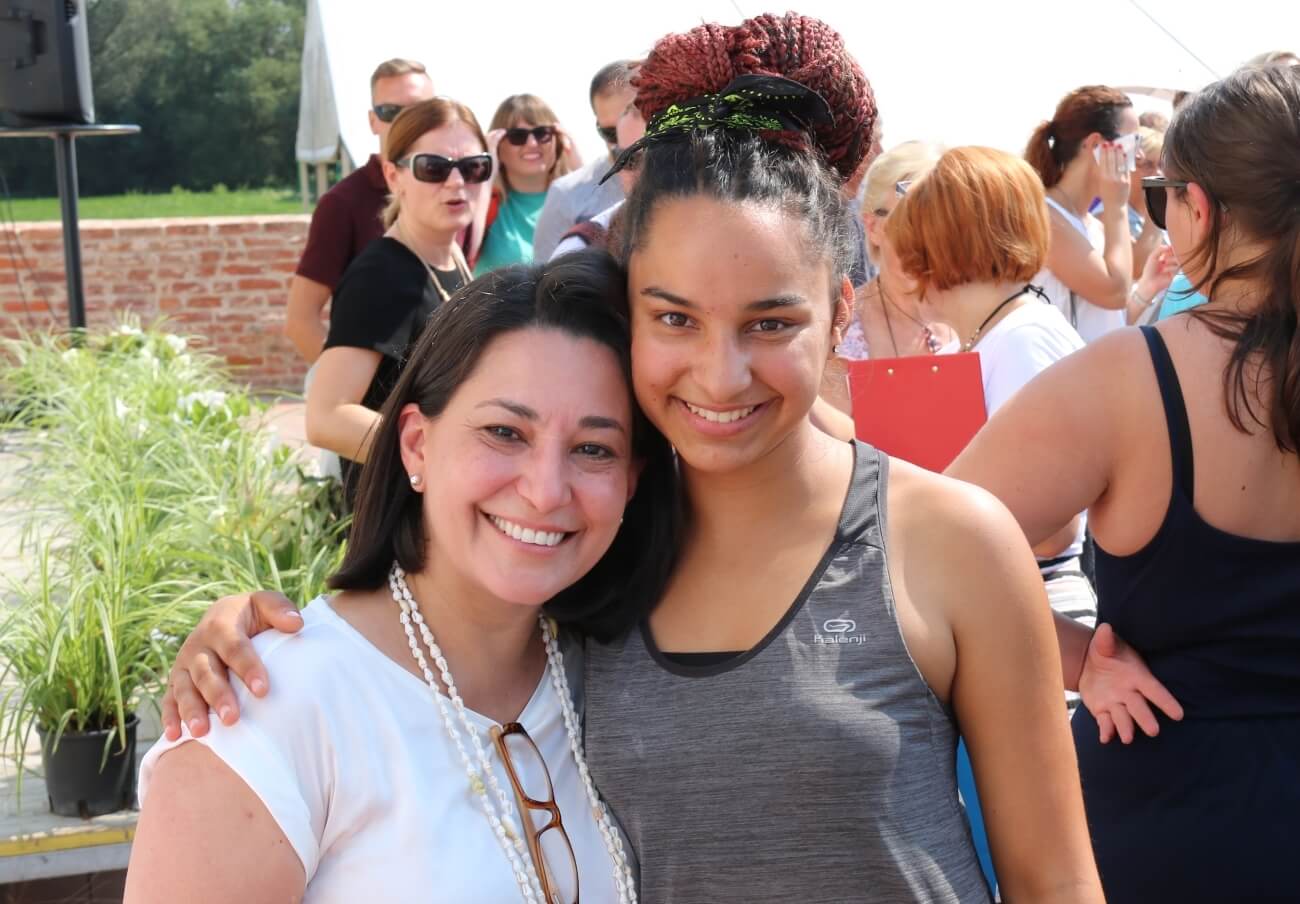
Regina M. Castillo on a foster family gathering © Marin Ilej/UNICEF
UNICEF Croatian Office is situated on Radnička cesta 41/7. To inform the public of their work, they built a considerable presence on Facebook, Twitter, Instagram, Youtube, and Linkedin. You can also find all UNICEF-related info for Croatia on their official website, and contact them via mail: This email address is being protected from spambots. You need JavaScript enabled to view it. or on phone numbers: +385 1 2442 660 and +385 1 2442 661. You can use the website to donate to a cause in Croatia too. Additionally, there are numbers: +385 1 4095 855, +385 99 2692 196, and +385 91 621 1039 for more details on donating to Croatia as well as e-mail address This email address is being protected from spambots. You need JavaScript enabled to view it.. You can also leave a donation to UNICEF in your will, and a phone number +385 1 3031 640 specializes for the issue in Croatia. If you find yourself in Croatia and you want to volunteer for UNICEF, more info can be found by sending a mail to This email address is being protected from spambots. You need JavaScript enabled to view it. and on phone number +385 1 3031 646.
And of course, you can donate for a good cause to UNICEF for any action the fund is internationally involved in.
To read more from the series "Friends of Croatia", follow TCN's dedicated page.
For more about UNICEF in Croatia, follow TCN's dedicated page.
Montenegrin Health Minister Jelena Borovinić Bojović Thanks Croatia For Vaccine Donation
ZAGREB, 25 May, 2021 - Montenegrin Health Minister Jelena Borovinić Bojović said in Zagreb on Tuesday that Croatia's donation of 10,000 vaccine doses was significant for Montenegro's efforts to inoculate its population against COVID-19.
In early May the Croatian government decided to donate 30,000 doses of coronavirus vaccines to Bosnia and Herzegovina and 10,000 doses each to Montenegro and Kosovo.
After meeting with her Croatian counterpart Vili Beroš, Borovinić Bojović thanked Croatia for that "big friendly gesture and great solidarity."
The donation of 10,000 doses will be "very significant in the process of mass inoculation that is currently underway in Montenegro," she said.
Croatia's Health Minister Vili Beroš underscored that Croatia's care for its neighbouring countries.
"I hope that we will contribute at least a little in the fight against this disease," said Beroš.
The two ministers discussed cooperation in the transplantation programme with Borovinić Bojović underscoring that Croatia has "shown especially good will to help us in resolving that problem."
She added that they discussed the signing of a memorandum of understanding that would enable Montenegrin doctors to come to Croatia for further training regarding transplantation surgeries.
The Croatian transplantation programme has been recognised beyond the borders of our country, said Beroš.
He underscored Croatia was willing to help Montenegro in that regard.
For more about politics in Croatia, follow TCN's dedicated page
PM Andrej Plenković: Decision on Croatia's Entry to Schengen Area Possibly in Second Half of Year
ZAGREB, 24 May, 2021 - Croatia hopes its entry to the Schengen area of passport-free travel could be put on the agenda during Slovenia's EU presidency in the second half of this year, Prime Minister Andrej Plenković said on Monday.
"I believe it is possible. We have excellent overall relations with Slovenia and it would be great if that happened during Slovenia's presidency of the Council of the EU," Plenković told reporters.
Plenković discussed Croatia's accession to the Schengen area and the euro area with European Council President Charles Michel and Home Affairs Commissioner Ylva Johansson.
Both the previous and current European Commission have confirmed that Croatia has met all technical criteria to enter the Schengen area and it is now up to the member-states, that is, the Council of the EU, to make a political decision on the matter.
Asked if he expected problems from some member-states, Plenković said that Croatia had succeeded in showing its partners through dialogue that it had met all criteria.
"I believe that we are heading towards a positive decision by the Council," he said.
The EC has said that on 2 June it will announce a new strategy for the Schengen area and two bills on changes to the Schengen evaluation mechanism and the Schengen Information System.
As for Croatia's other strategic goal, entry to the euro area, Plenković said that talks were underway with Executive Vice-President Valdis Dombrovskis and that Croatia could soon achieve that goal as well.
"I believe that we will manage to join the euro area in the next two years," said Plenković.
The Croatian PM and European Council President Michel discussed also the situation in Southeast Europe, notably Bosnia and Herzegovina.
Plenković said that Croatia supported its neighbours' European ambitions, underlining the need to amend Bosnia and Herzegovina's election law so that it could enable parliamentary elections in 2022 and be fair for all constituent peoples and other citizens.
For more about politics in Croatia, follow TCN's dedicated page.
Croatian Ambassador to Bulgaria Summoned Over Milanović's Statement
ZAGREB, 20 May (Hina) - Croatia's Ambassador to Bulgaria, Jasna Ognjanovac, was summoned by the Bulgarian Foreign Ministry on Wednesday over President Zoran Milanović's statement in which he strongly criticized "Bulgaria's policy towards the European integration of North Macedonia," Bulgarian media reported.
Ognjanovac was summoned at the request of Minister Svetlan Stoev, and she was received by the Director General for European Affairs, Rumen Alexandrov.
The reason for the meeting was President Zoran Milanović's statement after a summit of the Brdo-Brijuni Process at Brdo Pri Kranju, in which he sharply criticized Bulgaria's policy towards the European integration of North Macedonia, the Bulgarian BNT broadcaster said.
Alexandrov called Milanović's statement "unacceptable and unwarranted".
He said that it was "disappointing not just in the context of the excellent bilateral dialogue between Sofia and Zagreb and their unanimity on a number of topics on the European and regional agenda, but also in view of the fact that being the region's immediate neighbors, Bulgaria and Croatia are naturally bonded by a shared interest in the reform, stabilization and EU integration of the Western Balkans in the near future."
In a statement to reporters at Brdo Pri Kranju, Milanović warned that North Macedonia "is in an impossible position" and that one EU member state demanded that North Macedonia "define its national genesis in the way requested by the neighboring state" in history textbooks.
He said that he would "openly oppose" that within his powers.
Milanović did not name the state but meant Bulgaria, which is rejecting a negotiating framework for North Macedonia because Sofia claims, North Macedonian textbooks "revise and negate their common ethnic and linguistic history."
The Croatian ambassador said she would convey the Bulgarian position to Zagreb, noting the need for cooperation between Bulgaria and Croatia with a view to guaranteeing the stability of the Western Balkans and the region's European perspective, BNT said.
The Croatian Foreign and European Affairs Ministry confirmed to Hina that Ambassador Ognjenovac had been to the Bulgarian Foreign Ministry where the Bulgarian side conveyed to her its position.
For more about politics in Croatia, follow TCN's dedicated page.
Friends of Croatia: British Embassy - Brexit an Opportunity to Deepen Already Good Relationship
May 20, 2021 - The fifth article in the series "Friends of Croatia: British Embassy", saw TCN reporter Ivor Kruljac sit down with the UK Ambassador Andrew Dalgleish and discuss all things regarding diplomatic relations between the UK and Croatia. Diplomatic relations are, overall, really good and developing well, with Brexit being a challenge, but also an opportunity for deeper bilateral cooperation between the two European nations.
The diplomatic relations between the UK and the Republic of Croatia were formally established on June the 24th, 1992.
Almost 29 years later, I found myself in front of the Ambassador's residence and being warmly greeted by Snježana Vukić, the British Ambassador's advisor for communications. If you're inclined to think in stereotypes, you would expect a cup of tea, but instead, the cup of coffee with the creamy flat white texture turned out to be a much better beverage during the interview—both for me and for the Ambassador.
''We can sit wherever you like'', said Ambassador Andrew Stuart Dalgleish as he welcomed me inside the premises. A warm, kind, competent communicator that evened out the serious conversation about diplomatic topics with occasional humorous remarks to ensure both had an enjoyable and informative talk. The pins of both British and Croatian flags on his left coat lapel turned out to be a visual clue to the notion the friendship the UK and Croatia has long since held is still going well.
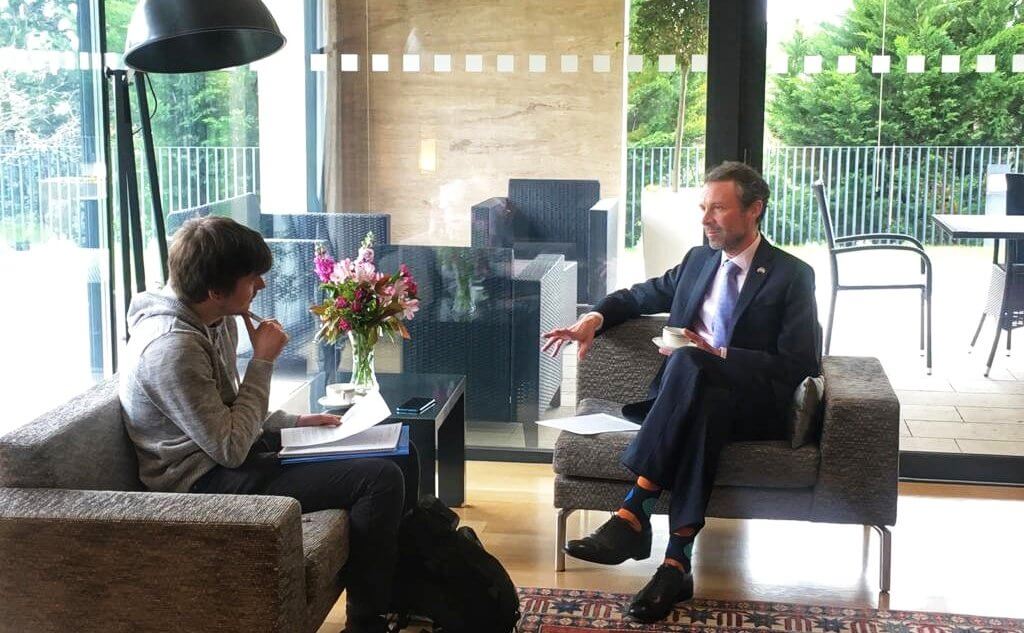
TCN reporter Ivor Kruljac with Ambassador Andrew Dalgleish © British Embassy Zagreb
Croatia and UK sharing western values
Andrew Dalgleish has served the UK as the Ambassador in Croatia since July 2016. He graduated with First Class Honours Degree in European Law at the University of Warwick, which included a year at Bordeaux University IV studying French Law. From 1998-1999 he worked in the Department of Social Security. His extensive knowledge of European law saw him work in UKREP (the United Kingdom Permanent Representation to the European Union) from 1999 to 2004, firstly as the Second Secretary for Social Affairs, and from May 2001 as a First Secretary for the Environment.
That same passion for the environment led him to DEFRA (Department for Environment, Food & Rural Affairs), where he was the Project Manager for the Climate Change effort during the UK Presidency of the EU, and he also represented the EU in UNFCCC plenary meetings. In his service to DEFRA from 2006 to 2008, he participated in the creation of the Office of Climate Change (2006), and moved to be the Deputy Head of Group, in Environmental Land Management too. From 2008 to 2011, Dalgleish continued working as the Head of the European Union Strategy Department, where he held preparations ahead of the Prime Minister’s European Council briefings and assisting other ministries in shaping deliverable policies; coordinating influencing strategies and lobbying efforts within the EU.
''I should tell you, I'd never been to Croatia before I arrived here professionally, and I'm one of those rare British people who hasn't been here on holiday“, Dalgleish began as I asked him about his impressions of the country, and of course, of Croats.
''What struck me the most was the warmth of the people, the welcome, general sense of friendliness. Croats are really proud of their country, and quite rightly so, and they also really want you to love the country too,'' said the Ambassador, adding that the Croats he met took him to lots of places and restaurants where he discovered various new dishes.
He continued that one of the delights of Croatia in his opinion is its variety, and he finds it impossible to pick one location that fascinated him the most.
''I remember going to Vučedol near Vukovar, and it was mindblowing. The walking that I can do in Žumberak, not far from Zagreb is fantastic. You go to Brijuni and you have Roman ruins, or you go to Poreč and you've got the basilica there, or Vis, which is a paradise,'' he stated in his list.
His description of Croats as warm and friendly seems to demonstrate to what we could call Croatian values. But, what are British values? When asked this question, Dalgleish argued that these are habits we may consider to be national characteristics, but they aren't values, per-se.
''Brits are very proud of the idea that we believe in fair play, that will we do the right thing even if we lose the game. Maybe that's why we're terrible at sports,'' the Ambassador said with a touch of humour as he was describing the national characteristics of British citizens.
While stating that Croats should be asked what the UK is most famous for in Croatia, as an Smbassador who frequently talks to Croats, he did manage to come up with some conclusions on the issue.
''Football, clubs such as Chelsea or Manchester City, but also the British sense of humour. Croats laugh at similar things as we do. So much British TV is here, and the cultural exchange is really, really important as well,'' said the Ambassado,r referring to cult shows such as Only Fools and Horses (Croatian: Mucke).
''The Royal Family is very recognisable here, too. I think lots of interest and affection is shown for the Royal Family, and of course our brilliant 'weather' “, the Ambassador added.
When it comes to joint values, the Ambassador noticed that Croatia and the United Kingdom share many opinions that are neither Croatian nor British values, but rather a Western, European, or even Transatlantic view of the world.
''This encompasses a wide range of things that we very often take for granted but which are the foundations of our societies", explained the Ambassador, citing examples the freedom of the media or the rule of law.
''The democracies we live in, embrace and find to be a really important foundation are what we need to protect and defend for the sake of our societies.''
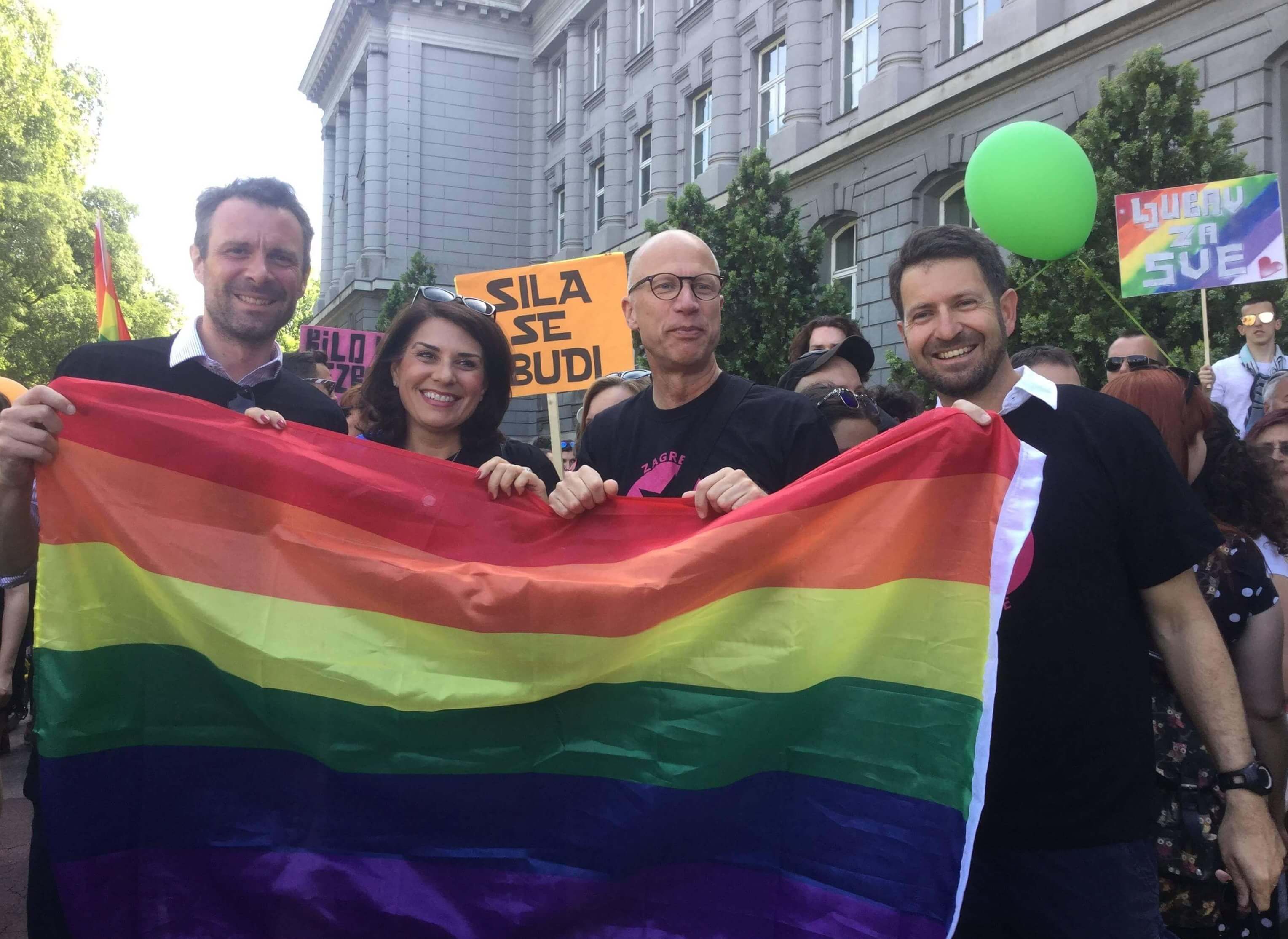
Zagreb Pride, Ambassador Dalgleish with other diplomatic colleagues during Zagreb Pride © British Embassy Zagreb
Things could be better at the commercial level, but there have been improvements...
The values ambassador Dalgeish described are the basis of diplomatic relations between Britain and Croatia, but how good is this relationship, actually? Where is it at its best, and where is it at its worst, where can things be better?
''The starting point is that diplomatic relations are really, really good, and I feel lucky that the cooperation our two countries enjoy is overwhelmingly positive,'' said the Ambassador. He added that as in any close relationship, two countries might disagree about something, but to the British Ambassador, being able to disagree and be fine with that is also a sign of a strong relationship.
''One great expression of our cooperation is NATO where we're really good, very close partners,'' continued the Ambassador, even referring to the recent DEFENDER-Europe-21 exercise in Zadar.
In addition to that, the recent visit of Royal Air Force Aerobatic Team to Croatia's Krila Oluje Pilots is also a good sign of cooperation and mutual friendship.

The Royal Airforce Aerobatic Team and the Ambassador © British Embassy Zagreb
''Croatia occupies an almost unique position in terms of expertise that it can give on Southeastern Europe, as well as comprehensive understanding of what is a very complicated situation in this region,'' he said.
''All of this is very good, strong and positive, and it makes a global impact, and it's not just about how our two countries get along,'' he said.
The Ambassador also added that both Croatia and the UK are members of the Global Media Freedom Pledge and stand for freedom in the media. He also works very closely with both the Croatian Government and Croatian president Zoran Milanović to promote awareness of the threat of climate change.
''You'd expect me to say I communicate the most with the Ministry of Foreign Affairs, and it would be true, it's where diplomatic relations are grown in a formal way. But I also communicate with all branches of the Government, with Parliament and with Pantovčak. Just today, I've been to the ''Dr Fran Mihaljević'' Clinic for Infectious Disease in Zagreb where I talked with its director, Professor Alemka Markotić, about what we can do about COVID-19“, added the Ambassador.
However, as expected, there are areas in which British-Croatian cooperation could be much better.
''Where I'd like things to be better, speaking very frankly, is in commercial relations. The UK has been less present on Croatian market and less accessible due to simple geography, especially when compared to the likes of Austria or Germany. When I arrived here, this is where I said I'd want to try to make a difference. I have made a difference, I hope. A small difference, but its a difference in the right direction, and the commercial relationship is better for that today,'' said the Ambassador.
These small steps saw trade in goods between the United Kingdom and Croatia increase by about 10% in the past few years, a good indicator of how things have been advancing, regardless of the concerns in the past that Brexit might affect it negatively.
''We've also seen investments from the Croatian side into the UK increase in the past few years – for example, Mate Rimac has just opened his research & development centre in the UK – we did help facilitate that through our Department for International Trade (DIT)“, added Ambassador.
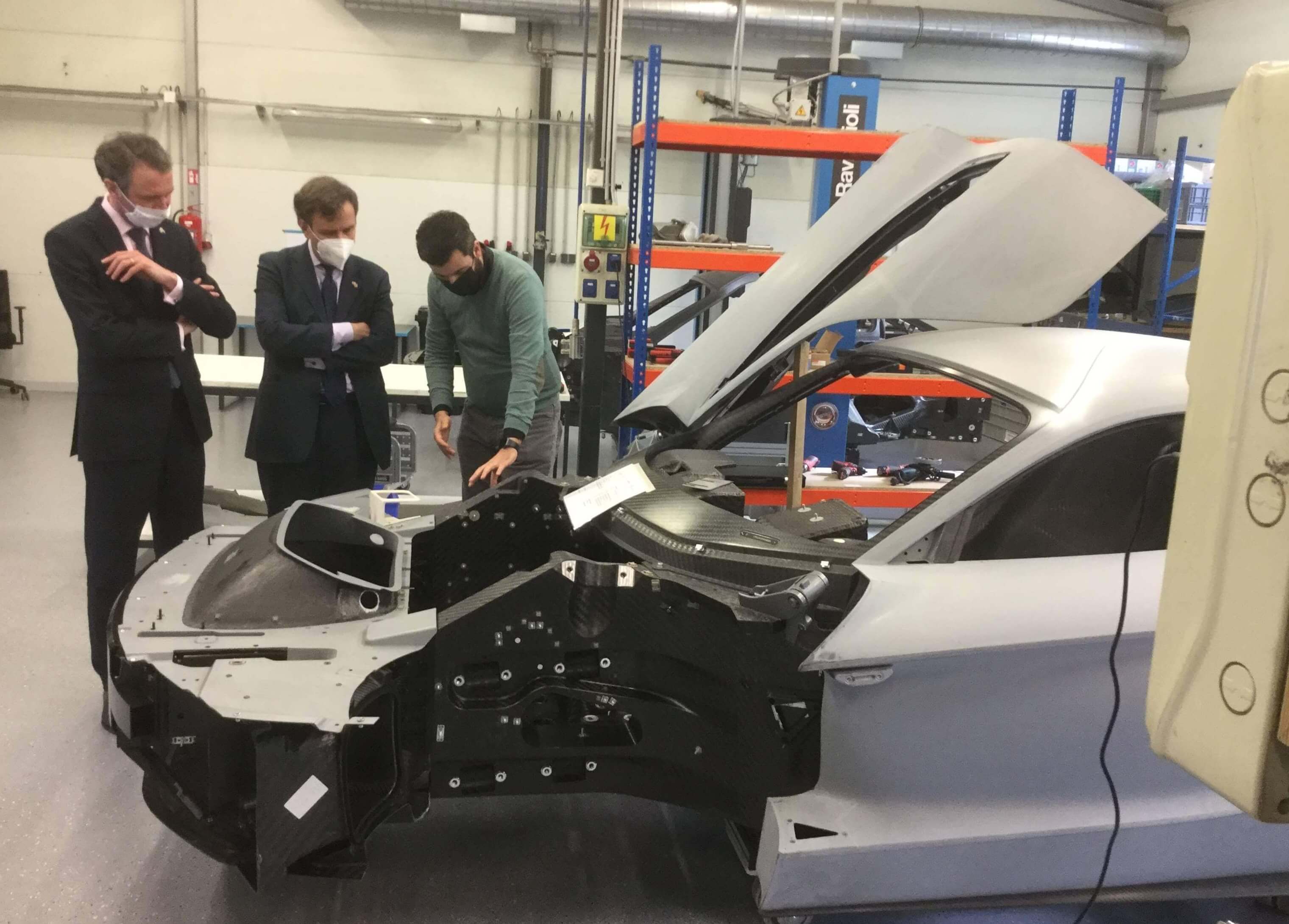
UK Minister Greg Hands and Ambassador Andrew Dalgleish with Mate Rimac in Rimac Automobili © British Embassy Zagreb
In addition, the Ambassador used every opportunity to facilitate business and trade contacts between the UK and Croatia. When UK State Secretary in the Ministry of International Trade, Greg Hands, visited Croatia last month, the Ambassador hosted a dinner for him with several leading Croatian business figures for both sides to explore how they might further improve business connections between the two countries.
On top of that, the recent confirmation from the Justice Ministry that British citizens may purchase property in Croatia only further benefited the development of trading between the two European countries.
Leaving the table for face to face conversation
The cooperation Ambassador Dalgeish described sounds great, but when it comes to diplomatic relations with the UK, the elephant in the room screams out in need of a special mention. Brexit remains a hot topic for the British public, and as Croatia is a member of the EU, what changes can Croatia expect in diplomatic relations with the UK as the European island nation which chose to step away from the bloc?
Dalgleish sees Brexit both as a challenge and as an opportunity to deepen diplomatic relations between the UK and Croatia.
''With 28 members states as it was before, you had so many people around the table that when ministers came together for a council meeting, there were just too many people to have a meaningful conversation one on one. So you'd say ''see you in Brussels'', and you would, and you'd wave, and you'd smile, and you might even say hello. But you don't have a meaningful conversation all the time,'' said Ambassador Dalgeish from his own recollection as he spent a lot of time in Brussels.
''We aren't at that table anymore. That means we're going to have to make more of an effort but also that we will have the opportunity to build a more meaningful relationship with Croatia and I think that's quite exciting for me in the job that I do,'' said ambassador Dalgleish calmly but optimistically.
''Whereas before, our bilateral business might have been conducted during these convenient moments in Brussels at these meetings, that doesn't happen anymore. Now, we will hold them in London, and we will hold them in Zagreb. I think that's quite the opportunity to build something more meaningful than what we had in Brussels,'' stated the Ambassador.
As the UK has a massive impact on the world and can boast of very strong diplomatic relations with other big players on the geopolitical stage, I wondered how important the relationship with Croatia actually is, from the UK's point of view, and in regards to the country's interest in global affairs.
''We look at Croatia as a global partner, and not just from the point of what we get from this bilaterally, but in what we're doing together to make a difference; Croatia sits as a partner,'' the Ambassador pointed out.
Already having mentioned the importance of Croatia's knowledge on Southeastern Europe and the instances of good cooperation through NATO, and issues such as climate change or COVID-19, the British Ambassador's claims are evidently backed up.
''I was sent here by the Foreign Secretary with a very serious mission to deepen the strength of the cooperation that we enjoy. It's a very important mission for me, and I think that's a reflection of how seriously we take the relationship with Croatia,'' confirmed the Ambassador.
The British Royal Family has always been very welcome in Croatia
The Ambassador already mentioned cultural exchange, and the British Embassy as an institution plays a significant role in the cultural promotion of the country. But, given the UK consists of four nations: England, Scotland, Wales, and Northern Ireland, is it possible to represent all these cultures equally? Being Her Majesty Queen Elisabeth II's Ambassador and representing the United Kingdom of Great Britain And Northern Ireland, Dalgeish shows his dedication to the job by equally representing all of the UK's four nations.
''We will proudly fly the St. George's Cross when it's St George's Day for England, but also the Saltire (Scottish flag), when it's St. Andrew's Day. I wouldn't say there is one element of the four nations that is dominant,'' said the Ambassador.
Culture is heavily linked with history, and the UK has been known in the past as a vast empire with colonies that are sovereign independent countries today. As Croatia was never colonised by the UK, are there any differences between the UK's relations with Croatia compared to other countries?
''The UK has a very long list of diplomatic relations, both with the countries who are part of Commonwealth, who were previously colonies, and with countries who were not colonised. So, there's no difference in forming a relationship with Croatia in comparison to such countries. There's nothing I can do about what happened in 1600's or 1700's, but I want to see what we can do in 2021,'' said the Ambassador, stating that the Ambassador's job is to look ahead, not backwards, to work on building the future, while acknowledging all the sensitivities of the past.
As the Ambassador already mentioned, his regular cooperation with the official bodies of the Republic of Croatia is the formal level of communication, while cultural exchange also has a key element in non-formal communication, particularly in education.
''I love going to schools. Talking to the kids about what they think about the UK, and what can they teach me about Croatia, and going to English lessons and causing chaos,'' said the Ambassador on his experiences with the school system in Croatia.
With the mention of the school system in Croatia, I couldn't help but recall my experience in education. Croatians seem to be quite talented when it comes English, but it is mostly pushed towards the American version of English.
''Oh yes I know, it's tragic,'' Ambassador Dalgleish joked in response when I shared my recollections.
He continued by saying that he is happy to see Croats speaking English so excellently, and he doesn't mind what version they learned, nor does he have any intention to have British English compete with American English.
''I don't hear too many American accents when talking to Croats, maybe it has something to do with British TV shows, maybe it doesn't, I don't know. But either way Croats should be very proud of how well they speak English,'' he concluded.
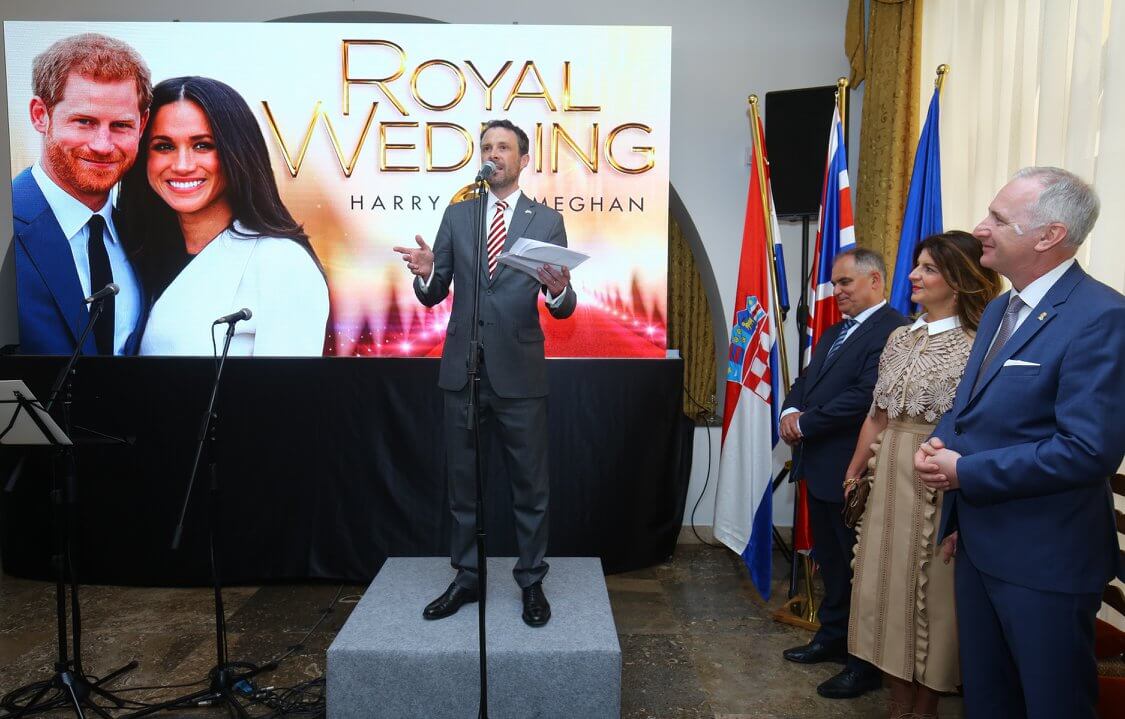
Ambassador Dalgleish on the Royal Wedding Party in Split © British Embassy Zagreb
As also already mentioned, the Royal Family is a big part of the of the fabric of Britain as it is a parliamentary monarchy.
The Royal family, particularly Prince Charles and Duchess Camilla seem to be very fond of Croatia indeed. Their last visit back in 2016 (following the Prince's earlier visit in 1996) saw the meeting with former Prime Minister Tihomir Orešković, former President Kolinda Grabar Kitarović, for whom Prince Charles highlighted his particular interest in the Croatian economy, as well as an interest in investing in Croatian youth. They also attended the commemoration of the 400th anniversary of the death of the famous English writer and poet William Shakespeare at the Croatian National Theatre (HNK) in Zagreb.
''Their Christmas card even had a photo of them with the members of a folk band from Osijek“, said Ambassador Dalgleish referring to the photo the British Royals took with the dancers of the HKUD 1862 ensemble.
And as Glas Slavonije reported, Osijek is very special to Prince Charles as his Great Grandfather Franz von Teck was born there.
Most recently, however, the Royal Family suffered a tragic loss as the much-loved Prince Philip passed away. Croatian Prime Minister Andrej Plenković expressed his deep condolences to Queen Elizabeth II publicly on Twitter, but as the Ambassador pointed out, he also sent condolences through official channels. Social media and overall technological progress now allows world leaders to communicate more directly, but it doesn't diminish the role of the British Embassy.
''Everyone who wanted to express their condolences, expressed them, from Pantovčak, to Parliament and the Government. Social media is an additional tool for us regarding public statements, but of course, embassies remain here for those sensitive issues that need to be discussed Government to Government, not over social media. We're also here for our citizens, and we can't be present in the whole country, so travelling, but also social media, are also very important here,'' explained the Ambassador.
The always attractive Dubrovnik was found to be the best example when it comes to culture in the country, as Game of Thrones and Star Wars were filmed there.
In the UK, the film industry, in addition to private incentives, gets financial support from the state, as the British Film Institute (BFI) is sponsored by a Government department. Following the examples of Star Wars and GoT, could there be more promotion from the BFI of Dubrovnik or Croatia in general as a good filming location?
''I don't really need to say anything about Dubrovnik. Dubrovnik speaks for itself, and more Brits visit Dubrovnik annually than anyone else,'' said the Ambassador with delight.
But if Dubrovnik did happen to need a good word or two; the Ambassador stated that he is not the tourist bord, and promoting Dubrovnik is not part of his duties.
''If someone from the UK contacts me and says that wants to film anywhere in Croatia, but is facing problems, then I'm here. But in general, the less I need to intervene, the better“, said the Ambassador adding that he found out about UK film producers filming in Croatia after it had already happened. One of the more recent examples of that was the filming of the ''The Ipcress File'' series in Zagreb, and the fact that the ambassador didn't need to intervene again only proves the steady and good relations between the nations.
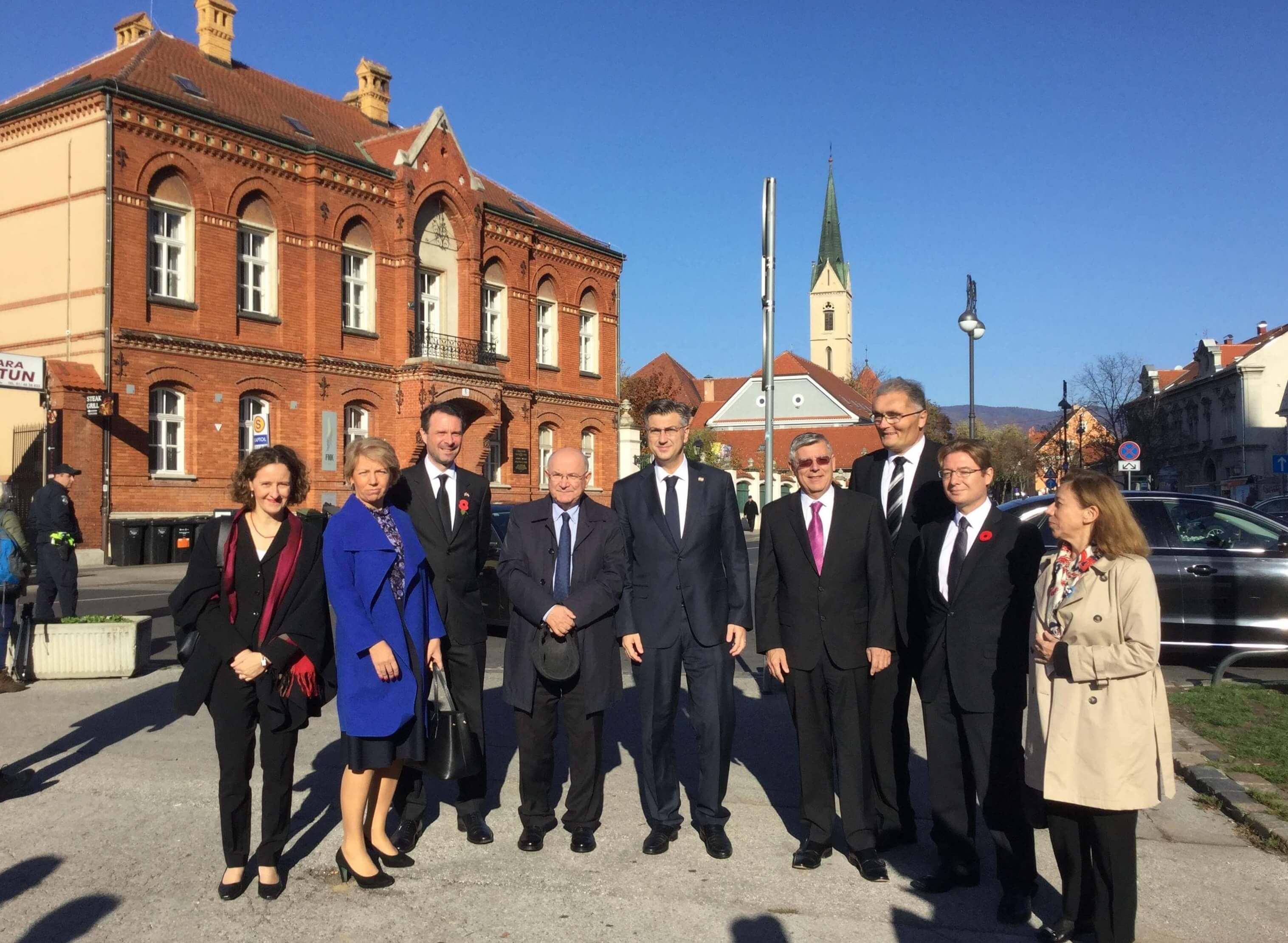
Ambassador Dalgleish, other Ambassadors and Croatian officials attending a Mass for all victims of WW2 at the Zagreb cathedral © British Embassy Zagreb
British and Croatian Ambassadors: Swapping countries but closely talking and cooperating
Foreign embassies, of course, are in Croatia for foreign citizens, and the British Embassy is no exception to that rule.
In addition to the British Embassy and a consul in Zagreb, the UK has two additional consuls: in Split and Dubrovnik, to make sure it is present for UK citizens, not just visitors, but also for Brits who work and live in Croatia.
''We have an honorary consul in Dubrovnik, which isn't officially part of the embassy, but is there to assist our citizens visiting Dubrovnik,'' pointed out Ambassador Dalgleish praising honorary consul Mark Thomas for doing a great job.
When it comes to Croats, visas to visit the UK are luckily not needed, but Croatian citizens can contact the embassy to get more information about Great Britain should they need to.
''When it comes to trying to invest in the British market or getting their products or expertise into the UK, Croats need to contact the Croatian Embassy in London. I'm frequently in contact with the Croatian Ambassador there, Igor Pokaz, who is doing a brilliant job for our two countries to fund and nurture different ways of cooperation,'' explained the Ambassador when discussing his relationship with the Croatian Ambassador in London, Igor Pokaz.
Overall, British-Croatian diplomatic relations are good in general, and the Ambassador's assurance that Brexit can be an opportunity to deepen the already good relationship is a promise to the bright future of friendship. But, as it takes two to have a combo as good as fish & chips, Croatia also has to show that it is willing to continue to develop a good friendship with the UK.
If you're a British citizen or a Croatian citizen in need of information, here is how you can reach a British diplomatic mission in Croatia:
In Zagreb:
British Embassy
Adress: Ivana Lučića 4
Mail: This email address is being protected from spambots. You need JavaScript enabled to view it.
Phone number: +385 1 60 09 100
British Council (for cultural realations):
Adress: Savska 32
Mail: This email address is being protected from spambots. You need JavaScript enabled to view it.
Phone number: +385 1 48 99 504
More info on British Council official website.
In Split:
British Consulate
Adress: Obala Hrvatskog narodnog preporoda 10/III
Phone number: +385 1 60 09 100
In Dubrovnik:
British Honourary Consulate
Address: PP 454
Phone number: + 385 1 60 09 100
For all the latest news about the British Embassy straight from the source, visit their official website. You can also follow them on Facebook, Youtube, Flickr, Instagram and Twitter (the British Ambassador is on Twitter and Instagram too).
To read more from the series "Friends of Croatia", follow TCN's dedicated page.
For more about UK - Croatia relations, follow TCN's dedicated page.


